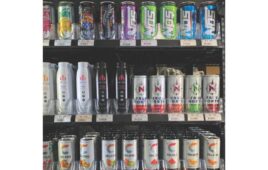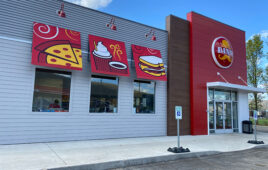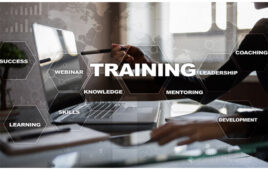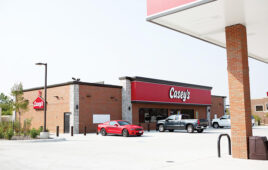Savvy c-store operators are using customer loyalty/scan-data-analysis programs to improve merchandise planning, forecasting and point-of-sale (POS) data management, and to provide a technology platform for long-term growth.
When done well, the inevitable result is to empower store personnel to react quickly, make more informed decisions and improve cost effectiveness, so they can simplify customers’ lives. While the technology is relatively new, the early adopters now have a couple of years behind them and are moving forward.
“The most important thing to understand is that a POS terminal does not really look at things at a basket level,” said Bryan Ritenour, national manager for payments for Circle K. “It counts the numbers of items, but does not interpret that A sells well with C, whether consumers are male or female or belong to a specific demographic group, therefore if you bundle offers you can cross-sell or upsell.”
As reported by CSD in April, Circle K recently gave its customers the ability to shop more quickly and conveniently at select stores using MasterCard PayPass.
Circle K management loves the speed of the transaction and the system’s ability to get customers through the line quicker, Ritenour said. In addition to MasterCard, the chain has partnered on the deployment with Visa, American Express and Discover. “The only one that really doesn’t have any cards out there in the marketplace today is Discover,” he said, “but they are diligently working towards that.”
The number of MasterCard PayPass cards and devices in use has reportedly grown from nearly 13 million in late 2006 to more than 50 million as of the fourth quarter of 2008.
According to consumer research released by the Smart Card Alliance, approximately 9% of the U.S. population has a contactless payment card or device.
Circle K’s program began as a 10-unit pilot, then expanded gradually first to 50 stores, then 100. At present, it is in use in between 1,600 and 1,700 of the chain’s 3,000-plus stores. It is scheduled to go systemwide by the end of this year, Ritenour said.
Transaction speed could hardly help but improve under the program, Ritenour said. “The customer doesn’t have to hand his card to the cashier and have him swipe it, then enter a PIN. Now the card doesn’t leave the customer’s hand, which is also a security benefit.”
Ritenour said he has no plans to use the PayPass system outside the store. There, he said, “the customer is holding onto his card anyway. We don’t think there’s that much of a savings on speed or security as there is inside. It’s a lot more costly to do, too.”
Community Rewards
Gulf Oil in Newton, Mass., one of the Northeast’s largest wholesalers of refined petroleum products, announced in March that it would begin offering its customers the ability to lower their price of gas through a new retail-partner program. Through the program, which is called Override, consumers who make a minimum purchase of $50 worth of groceries with their Shaw’s Rewards Card earn an immediate 10 cents off a gallon of gas—up to 20 gallons—at participating Gulf Oil locations.
Dunkin’ Donuts’ customers who spend $20 or more with their Dunkin’ Rewards Card earn five cents off each gallon of gas at Gulf. Those savings can then be redeemed immediately at participating Gulf locations throughout New England.
Both Shaw’s and Dunkin’ cards can be swiped right at the gas pump to earn the savings. The gas-savings program with Gulf was piloted at eight locations in the Worcester and Gloucester, Mass., markets, and presently stands at 160 locations. By June, that number jumped more than 200.
“For us, this was about creating value around the Gulf brand, the Gulf offering,” said Ron Sabia, the oil company’s president and chief operating officer. “We were looking for something to drive volume to our facilities, which it has done incredibly well. We’re up in redemptions 50% in a short time.”
More Reasons to Shop
Quality State Oil’s 20-store Q Mart Marketplace chain has a program that works like this: consumers sign up for an RFID key tag and carry it on a key ring or inside their wallet. When they pass it over a sensor either inside or outside the store the system tracks the purchase. Once they reach various sales milestones, they receive incentives.
“The thing we’ve focused on is trying to get partnerships with all our vendors to give the consumer more reasons to shop our stores and stay loyal to Q Mart,” said company Vice President John Winter. The key-tag program has four basic components: points, club and random rewards and sweepstakes. At present, about 66,000 consumers are carrying members.
The loyalty program has become what Winter calls “the backbone” of its marketing plan. The random rewards help spur consumers to explore deeper into the store, and it’s been effective. Q Mart’s Star Gift Center has seen sales jump by $250,000 in the last three years.
“We send out to every 100th customer tiered coupons—$1 off the first $5 spent, $2 off the next $10, etc. The consumers have taken the time to actually look at those novelty departments, and have shopped them more,” Winter said.
What Winter and his colleagues like most about their program, is they “ can go in any direction, create any marketing concept and reach the consumer,” he said. “I can do so many different things with this platform versus having a UPC base. We can literally teach the consumer to buy something different by offering random rewards.”
Winter described his chain as a little different from the outset because its goal is to get consumers to do fill-in, take-home shopping. “For example, we try and get them to buy case water, not a bottle” he said.
This strategy is working. Ice Mountain, a division of Nestlé Waters, reported that Q Mart is the No. 1 outlet operator in sales of cases. “What we’ve done is develop reasons why a consumer should use the key tag to earn their free stuff,” Winter said.
Laying the Foundation
Q Mart has also layered in opportunities for consumers through gasoline giveaways. It is currently running a $25,000 gas giveaway promotion in which stores randomly hand out $1, $5, $10 or $25 to consumers through the reward system. “There are about a thousand people per month that get free gas just for being loyal to Q Mart,” Winter said.
In all, Q Mart maintains about 70 “clubs,” offering consumers various “buy this, get this” offers on items ranging from coffee and cappuccino to Coke and Pepsi 12-packs. Results are tracked monthly and vendors are billed back quarterly. Winter credited the program for a sharp boost in beer sales, which are up about $1 million over the last five years.
Greg Lassus, vice president of 37-unit Lassus Brothers Oil Co. in Ft. Wayne, Ind., said his chain’s three-year-old loyalty program includes 10-15 clubs that offer a variety of rewards.
“We have a standard fountain club, coffee club, bread and milk clubs. We also promote vendor products through clubs, like a Skoal club, Grizzly club, 20-ounce. clubs with Coca Cola. We focus on building clubs with top sellers,” said Lassus, who uses Outsite Networks for his loyalty program. “We also have up to an eight-cent discount on gas as a fuel incentive, which is driving business inside and outside the convenience store.”
Big Oil companies are poised to make a big splash with loyalty. The challenge is that there are so many branded marketers with mixed offering from state to state, making a cohesive program difficult. BP is one of the companies that is moving full steam ahead. It has been making changes to its software and POS equipment that would enable a cents-off promotion on fuel purchases, said Scott Dean, a spokesperson for BP America Inc.
From November 2008 through January 2009, motorists nationwide with select Garmin portable navigation devices were able to receive ads encouraging them to stop at BP, ARCO or ampm locations. Depending on the region, motorists in West Coast states saw ads for ARCO gas stations or a free coffee offer available at ampm convenience stores. Offers like a free 12-ounce cup of coffee at ampm or a chance to win a $100 gas card at BP and ARCO stations were redeemed by texting a promotional code via cell phone, resulting in a coupon being sent directly to the phone. NAVTEQ’s interactive advertising service delivered the advertising along with real-time traffic content–available free to the consumer for the lifetime of an applicable Garmin device.
Price Focus
In April and May of this year, BP started talking to branded jobbers and franchisees about a point-of-sale enhancement initiative it hopes will lay the foundation for future branded card and loyalty offers. The company envisions future card offers that allow consumers to redeem cents-off-per-gallon rewards immediately at the pump with a card swipe, Dean said.
For example, a card member could use his rewards to pay for a portion of the posted price. Approved grocer loyalty programs could also use BP’s price rollback functionality to reward loyal grocery customers with cents-off-per-gallon fuel rewards.
“While final card offers and loyalty program partners are still pending, the demand for price rollback functionality warrants beginning the brand-wide deployment process now,” said David VanWiggeren, BP manager of card marketing.
The company will fund and support a large-scale software deployment effort for qualified marketers. For sites with BP price rollback compatible POS devices, which represent the majority of sites, no new hardware is required.
To qualify for the BP price rollback initiative, sites must have three or more dispensers and compatible POS devices. Compatible devices include: Verifone Ruby; Verifone Sapphire; Verifone Topaz; Gilbarco Passport; Wayne Nucleus; and Retalix Store Point. CSD
Driving Loyalty Sales
Jay Petroleum’s Pak-A-Sak convenience stores are driving business with its growing Purchase And Save (PAS) loyalty program. Customers earn points on every visit to one of the chain’s 37 stores in Indiana and Ohio. For examples, customers receive 10 points per gallon purchased at the gas pump and 20 points per dollar in the store, excluding restricted items such as lottery tickets money orders and third-party services. Points are doubled on Wednesdays.
Rewards include free coffee, fountain beverages, 12-packs of soda, candy bars and bottled water, and up to four cents off each gallon of fuel purchased. As part of the program, month-to-date purchases are accumulated to increase rewards. Monthly benefits earned are valid through the following month. The more customers buy, the more points they earn.
Plus, Pak-A-Sak offers Lucky 7 Club rewards. Customers using their PAS card to purchase seven coffees, cappuccinos, gallons of milk, Teazzer iced teas, money orders or its Pak-A-Sak proprietary bottled water earn the eighth one free.




